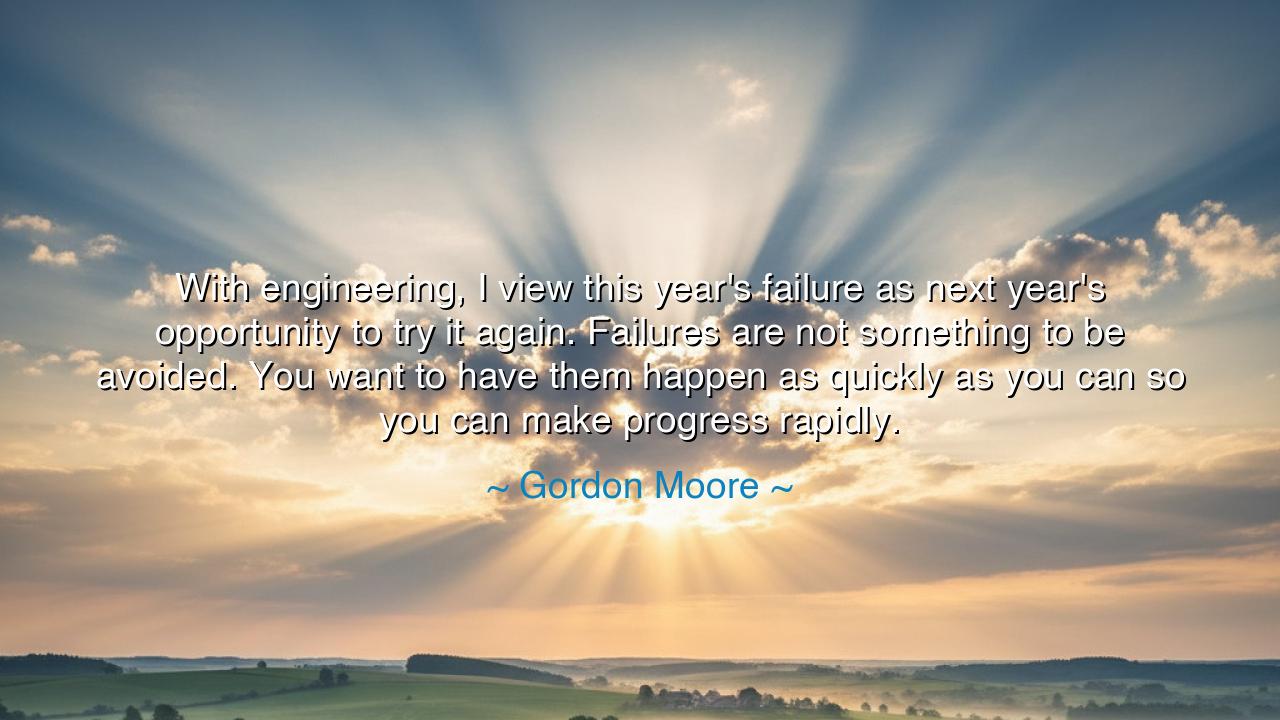
With engineering, I view this year's failure as next year's
With engineering, I view this year's failure as next year's opportunity to try it again. Failures are not something to be avoided. You want to have them happen as quickly as you can so you can make progress rapidly.






Host: The afternoon sun had shifted, casting a gentle glow across the room. The café, though busy, had settled into a comfortable rhythm — the low hum of conversation, the soft clinking of cups, the occasional laughter in the background. Jack and Jeeny sat at their usual corner, their conversation flowing naturally as the world outside continued on, unaware of the depth of the words being exchanged inside.
Jeeny: She leaned forward slightly, her eyes focused, almost as if considering something deeply. “I came across something today, Jack. A quote from Gordon Moore: ‘With engineering, I view this year's failure as next year's opportunity to try it again. Failures are not something to be avoided. You want to have them happen as quickly as you can so you can make progress rapidly.’”
Jack: He paused, looking at her with a raised eyebrow, his voice skeptical. “Failures should happen quickly? That’s a pretty unusual take. Isn’t the whole point to avoid failure as much as possible? How can anyone make progress by failing all the time?”
Jeeny: She smiled, the glint of understanding in her eyes showing she anticipated his reaction. “But I think Moore is saying that failure is a necessary part of progress. Especially in fields like engineering, where new ideas are constantly being tested, you can’t avoid failure if you want to innovate. Failure teaches you what doesn’t work, and the faster you fail, the faster you can learn and grow.”
Host: The light in the room softened, the air around them quieting as Jack took in her words. The concept of failure as a tool for growth seemed almost counterintuitive to everything he’d been taught about success and achievement. The subtle clinking of coffee cups and the murmur of conversations around them felt far away as the conversation deepened.
Jack: “But isn’t failure still… a setback? If you fail, don’t you lose time, effort, and resources? How is it useful if it costs you so much to learn from it?”
Jeeny: Her voice was calm, almost reassuring. “It’s not about looking at failure as a loss, Jack. It’s about reframing it. Moore is talking about a mindset — a mindset that embraces failure as a part of the process. Failure becomes feedback instead of defeat. The quicker you fail, the quicker you learn, and that accelerates progress. If you’re always avoiding failure, you’re never taking risks. You’re never pushing the boundaries of what’s possible.”
Host: The room seemed to breathe with the weight of their words, the air between them charged with the quiet tension of this realization. Jack sat up a little straighter, his fingers lightly tapping the side of his coffee cup, clearly reflecting on the idea that failure could be embraced, not feared.
Jack: “So you’re saying that if you’re not failing, you’re not really moving forward? That failure, when it happens quickly, is a sign that you’re on the right path — that you’re pushing yourself enough to reach new limits?”
Jeeny: “Exactly. Failure, in that sense, isn’t a dead end. It’s a checkpoint. It’s a moment to adjust, to recalculate, and then try again with a little more knowledge than you had before. The more you embrace failure as part of the journey, the faster you’ll move toward success. The biggest innovations often come from moments where things went wrong, but that failure revealed the next step forward.”
Host: The light in the café had deepened, the quiet of their conversation contrasting with the outside world’s constant movement. Jack looked at Jeeny, his expression softer now, a hint of understanding dawning.
Jack: “I guess I’ve always thought of failure as something to avoid at all costs. But now I see how it’s part of the learning process. If you’re never failing, you’re probably never really testing your limits. You’re just playing it safe.”
Jeeny: “Exactly. Growth happens when you push beyond what’s comfortable, when you dare to fail and learn from it. Progress doesn’t happen in a straight line — it’s full of bumps, detours, and failures. And the quicker you can get through them, the quicker you can get to the next breakthrough.”
Host: The afternoon seemed to wind down as the conversation settled into a quieter, more reflective pace. Outside, the world carried on as usual, but inside, Jack and Jeeny had shifted their understanding of failure — no longer as something to fear, but as a powerful tool for progress. Jack leaned back in his chair, a small smile crossing his face, realizing that embracing failure might just be the key to pushing beyond his own limits, and that, perhaps, the path forward was found not in avoiding mistakes, but in learning from them as quickly as possible.






AAdministratorAdministrator
Welcome, honored guests. Please leave a comment, we will respond soon